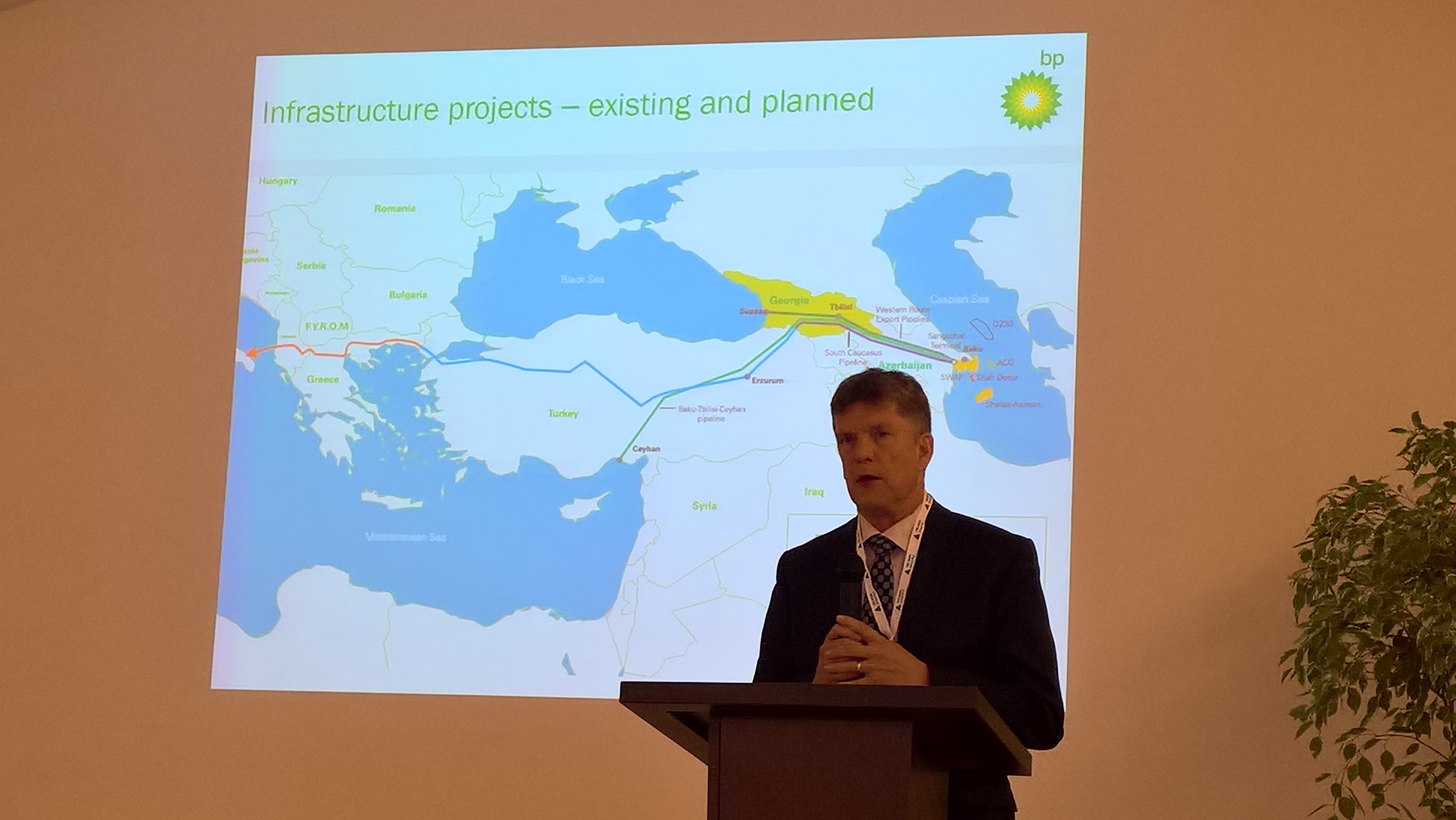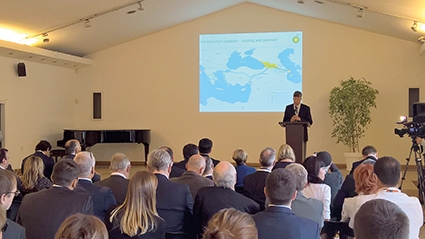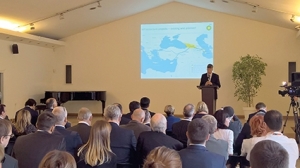British Petroleum in Georgia: Ongoing Achievements
Christopher Schlueter, BP Georgia Country Manager and Area Operations Manager, was invited as a speaker at last Friday’s Bristol Business Conference, which was attended by numerous investors interested in hearing the British experience of Georgia’s successful development.
BP in Georgia has evolved from a few pioneers during its early days in 1996, to a peak workforce of 6,000 employees during construction works of the Southern Caucasus Pipeline, to today's operational workforce more than 500 employees.
BP is one of the world’s leading integrated oil and gas companies on the basis of market capitalization, proven reserves and production. Globally, it employs nearly 80,000 people and has exploration and production interests in more than 70 countries, including the midstream pipeline activities in Georgia.
In Georgia, BP operates the Baku-Tbilisi-Ceyhan oil pipeline (BTC) and South Caucasus gas Pipeline (SCP) on behalf of two international consortia of energy companies and investors. The BTC and SCP pipelines run side-by-side for 248 kilometers within the country.
Christopher Schlueter, who has lived in Georgia for five years, told conference attendees more about what BP has achieved in the region, and in Georgia in particular.
“BP came to Georgia over 20 years ago shortly after the ‘deal of the century’ was struck in the Caspian Sea to exploit the oil and gas resources there. BP was at the core of that deal and it came about due to the actions of many governments willing to make it happen. Georgia is right in the heart of that. The only way to move these resources West is through Georgia, which is a key player in that transit,” he said.
To date, BP has invested $4 billion in Georgia, and Schlueter was happy to confirm to future investors the potential of investing in the country.
“In 1996, our first development in Georgia was the Baku-Supsa pipeline. The route had already been established during Soviet times and we reestablished it. In 1999, the first tanker was loaded at the Supsa Terminal, and we’ve been proudly and safely loading tankers there ever since,” Schlueter noted. “Every week a tanker leaves Supsa Terminal, carrying 100-150 thousand barrels.”
The next project, which fully unlocked the Caspian, was the Baku – Tbilisi- Ceyhan line. Construction on that started in the early 2000s and concluded in 2006, and it now transports one million barrels a day at peak capacity.
“Shortly after that we built the first major gas pipeline through Azerbaijan and Georgia to Turkey, known as the South Caucasus Pipeline, which has been operating since 2007,” the BP Georgia Country Manager said. “These three pipelines alone put Georgia as a hugely significant player on the global map, transporting essentially 1% of the world’s hydrocarbons. One out of every hundred barrels of hydrocarbons that the world consumes, by which I mean oil, and gas produced from oil, comes through Georgia, and it is something to be proud of.”

BP’s latest project in the region is a gas pipeline running from the Shah Denis 2 oil field in the Caspian Sea to Italy. It comprises four big projects altogether. The Georgian section is ready, the Azerbaijan section of the pipeline is set for completion in the next few months, the Turkey section is ongoing and the remaining European section crossing through Greece will be the final stage to construct.
“We spent $2 billion in the last four years building a 42 inch-diameter pipeline from the Azerbaijan border through to Turkey, which includes two massive new compressor stations, one in Gardabani which is already online, and another in Tsalka at high altitude, set to start up in three months. At the border, this pipeline will connect with the TAP pipeline, much of which has been built but with a lot more still to be done, including the compressor stations. But the Georgian part is already providing Turkey gas at a low initial rate, as per targets, and is expected to reach full operation within at least four years,” Schlueter informed the audience. “BP is proud to work with the Georgian government and partners that have helped make Georgia a guiding star of success- we are the first on the Southern Gas Corridor to be in operation. It is the largest hydrocarbon development happening anywhere in the world right now, and for Georgia to be a part of that is a huge endeavor and a tribute to the success and confidence that comes with doing business in Georgia, working with the government, and with the communities, stakeholders and investors.”

During the construction of the Southern Gas Corridor, BP Georgia had 6000 workers, 75% of whom were Georgian nationals. Engineering officers in the UK designed the pipeline, and British experts then trained the Georgian personnel how to build, operate and maintain an oil and gas facility. Almost the entire operation in Georgia is now run by Georgians- Christopher Schlueter being just one of a handful of non-nationals working here for the company.
“So, let there be no question of the workforce capability in this country!” he stated.
He went on to reflect how dramatically the country has changed over the past 25 years.
“When we built the Supsa Terminal and turned the generator on, those were pretty much the only lights shining in that part of Georgia. Look where Georgia is today in terms of road infrastructure and developments!”
He then spoke of the 44 communities that BP Georgia has invested time and money in- in terms of supporting SME development, education and more.
“When you put a pipeline through a community, you need to develop relations with that community, and we have a very proud history of doing so,” he said. “BP has spent $100 billion since it arrived in Georgia on community initiative projects and social development projects, the kind of contribution any big business can make when entering a country like Georgia.”
Schlueter also mentioned the energy efficiency and waste management projects BP Georgia has invested in as an important part of their operations here. Vocational education programs are another focus BP Georgia has.
“Right now, we’re working with the Georgian Technical University and the Millennium Challenge Corporation on a VET program to train electricians, mechanical technicians, operations technicians, and control technicians for the benefit of the country as a whole, not just BP.”
To conclude, Christopher Schlueter once again put emphasis on Georgia’s potential as a good country to invest in: “BP appreciates being able to operate in Georgia in world-class levels of safety, environment, performance, reliability, and cost-efficiency.”
By Katie Ruth Davies











